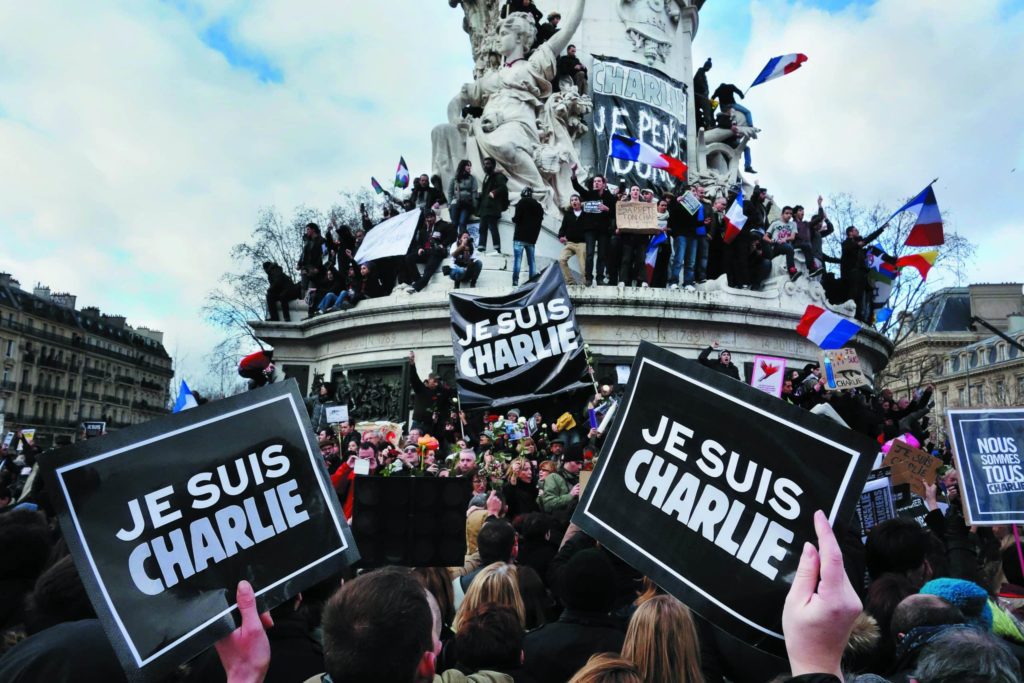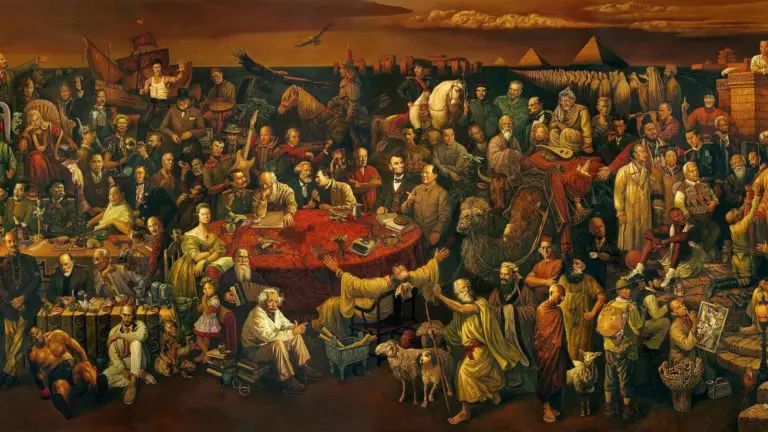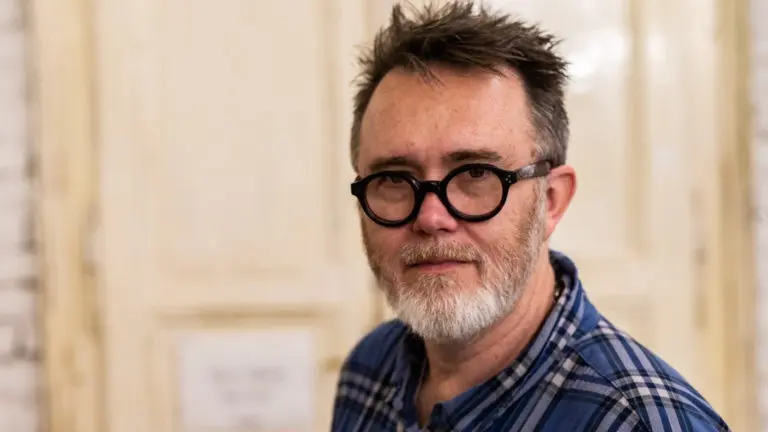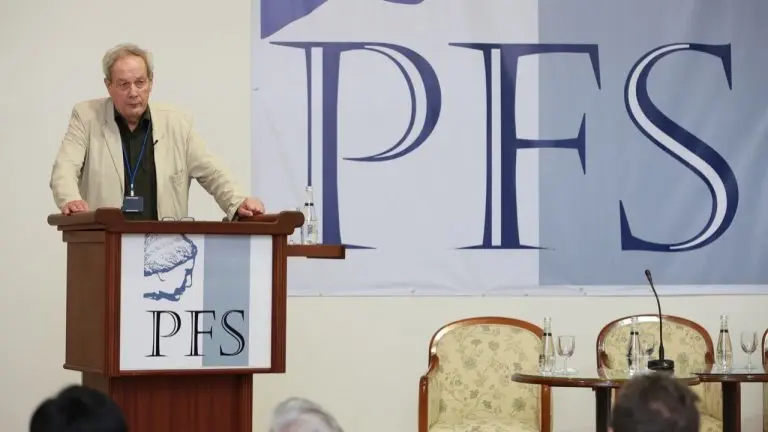As the 20th anniversary of 9/11 passes, we can begin to see, as in a glass darkly, how the long war on terror has affected the West’s cultural self-understanding. In strategic terms, the forever wars launched after 9/11 spectacularly failed to achieve an outcome better than the status quo ante. Little attention, however, has been given to what two decades of media representation of jihadism, asymmetric violence, and military intervention have had upon Western popular culture. The genres of film, the novel, art, and popular music have all addressed the long war on terror from a variety of perspectives—but the prevailing tone might be summarized as, at best, agnostic, at worst, masochistic and self-loathing.
In the evolving cultural response to the war, few movies or novels have taken a positive view of the U.S. government and its coalition partners’ decision to invade Iraq in 2003. Kathryn Bigelow’s The Hurt Locker (2008) and Zero Dark Thirty (2012), as well as Clint Eastwood’s American Sniper (2014) are perhaps the exceptions. They offer the most conventionally supportive treatment of the U.S. military and intelligence agencies fighting the good fight overseas. So, too, did a number of Country and Western singers whose songs might (and occasionally did) serve as a musical accompaniment to the fight ‘over there.’
By contrast, the majority of U.S. and European filmmakers and pop icons have adopted a morally ambivalent and increasingly critical posture to the war and the Western democracies’ political response to terrorism post-9/11. On the domestic front, films and TV series have dealt tangentially with the home-grown jihadist phenomenon focusing instead on the evolving surveillance state that manipulated ‘the politics of fear’ to impose and extend already authoritarian state control. The British film V for Vendetta (2005) established this dystopian mood. Set in an alternative future, the elusive masked anarchist V subjects a paranoid white supremacist government in the UK to asymmetric terrorist attacks. Subsequently, drama series like Bodyguard (2018) and The Informer (2018) present government ministers and the shadowy apparatus of the security state manipulating putative Islamist terrorists to promote a covert and fascist political agenda.
The writers of these dramas nonetheless have struggled to differentiate their approach to the surveillance state from series like Homeland or The Bureau, which experienced less difficulty in representing Islamically motivated terrorists. The progressive mainstream press, somewhat predictably, criticised all these series, irrespective of nuance, for “their cliched description of modern Islamic terrorism.” Depicting terrorists from diasporic Asian backgrounds committed, it seemed, the hate crime of Islamophobia.
Media condemnation notwithstanding, the Western genre of film and television occasionally offered an intelligent, dramatic response to the moral and political dilemmas raised by the long war on terror. From United 93 (2006) to Homeland (2011-20), The Bureau (2015-20), and Eye in the Sky (2015), these films and series thoughtfully explored the difficult moral terrain that the long war exposed for the liberal conscience.
The novel, by contrast, has offered only a relativist uncertainty about 9/11 and its aftermath, as is evident in Ian McEwan’s Saturday (2005) or Claire Messud’s The Emperor’s Children (2005). Meanwhile, those novelists who engaged directly with the jihadi character offered only crude stereotypes like Sheikh Rashid in John Updike’s Terrorist (2006) or Bassam al Jizani, longing for shaheed, in Andre Dubus III’s The Garden of Last Days (2008). Meanwhile, novelists who found the war on terror a state conspiracy to spread domestic fear—like Richard Flanagan in The Unknown Terrorist (2006), Mohsin Hamid in The Reluctant Fundamentalist (2007), and John le Carré in A Most Wanted Man (2008)—either considered the jihadist character an invention of the security state or a somewhat complex but sympathetic character, like le Carré’s Dr. Abdullah and Hamid’s Changez.
If the literary response was equivocal, the popular music response was ephemeral, transitory, and somewhat predictable. Patriotic country and western singers supported the war until it seemed pointless, whilst protest music post- 9/11 embraced a self-consciously radical pacifist posture. Whilst country & western artist Toby Keith sang “you’ll be sorry you messed with the U.S. of A. / ’Cause we’ll put a boot in your ass / It’s the American way,”the left coast band Green Day condemned the war on terror because “I don’t want to be an American idiot / Don’t want a nation under the new media / And can you hear the sound of hysteria?”
Meanwhile, the visual arts, together with academia and the mainstream media, have offered even less insight into jihadist motivation or the rationale for Western intervention in states of concern. The liberal arts establishment sought to adopt a ‘balanced’ approach to asymmetric violence. The fact that video artists like Theo van Gogh and Ayaan Hirsi Ali or the Jyllands Posten and Charlie Hebdo cartoonists might suffer assassination or death threats for satirizing Islamist fanaticism failed to trouble this Olympian pursuit of neutrality.
What, however, became evident in the wake of the Charlie Hebdo killings in 2015 was that the official, progressive post-9/11 mindset had difficulty in portraying Islam as anything other than a peaceful religion. This unwillingness to question, interrogate, or criticize reinforced an evolving media, academic, and artistic climate of self-censorship. Cross-dressing British artist Grayson Perry was one of the few to admit a baser motive for this posture. In November 2007, Perry acknowledged “The reason I have not gone all out on attacking Islamism in my art is because I feel the real fear that someone will slit my throat.” A little fear went a long way.
Empathy, Islamophobia, and the prehistory of hate speech
In the wake of the Charlie Hebdo attacks, the corporate media along with European and U.S. political elites came to endorse, in the name of a fashionable commitment to diversity, a minority practice of religious intolerance. Tolerating intolerance as a response to blasphemy legitimated a growing and widespread condemnation of statements or artistic representations that might cause offense on British, European, and North American campuses. Hate speech, ‘trigger warnings,’ and ‘no-platforming’ campaigns were the ineluctable consequence.
Curating the Imperial War Museum’s 2018 Art in the Age of Terror exhibition, Sanna Moore told The New York Times that the show reflected how the West has changed, and not for the better, through “mass surveillance … and detentions without trial.” The ‘age defining’ artwork on display explored not only personal reactions to 9/11 but also the manner in which Western civil liberties had been “compromised and security and surveillance amplified.”
A visitor to the exhibition would have quickly discerned that the civil liberties at stake were those of Muslim minorities after 9/11, not those of cartoonists or filmmakers assassinated for having an ‘Islamophobic’ reaction that deviated from the prevailing progressive norm. Wandering through the rooms devoted to Art Since 9/11 a spectator would struggle to find any reference to Theo van Gogh, Jyllands Posten, or Charlie Hebdo’s cartoons or “the complex issues” they might have raised. Instead, the show addressed four themes: the artists’ critical responses to 9/11; the intensified levels of state control after 2001; advancements in weaponry, particularly drone warfare; and the destruction caused by conflict that has “turned homelands into wastelands.”

Theo van Gogh photographed in September 1984.
PHOTO: COURTESY OF SJAKKELLEN VOLLEBREGT, LICENSED UNDER CC BY-SA 3.0 UNPORTED.
Nowhere, however, were the actions or the images of those who perpetrated either the 9/11 or London 7/7 attacks represented. The artwork curated by the Imperial War Museum instead gave simplistic visual support to a radically pacifist, critical terror theory. This fashionable perspective—which found traction on university campuses after 2005—held that Western interventions created instability abroad, and jihadism and a surveillance state at home. Its critical tolerance of Islamic intolerance silenced the secular right to blasphemy and cancelled viewpoints on campus or in exhibitions deemed Islamophobic (or, as the ‘woke’ argot extended its remit after 2016, racist and colonialist).
The visual arts, museum collections, and exhibitions—like the university departments of the arts, humanities, and social sciences that promoted this attack on the Western way of war—are, ironically, the most heavily state subsidized institutions of Western cultural life. However, they have adopted and promulgated a ‘reflexive’ sympathy with the non-Western ‘other,’ in the shape of the jihadist, which contributed, over time, to a self-lacerating assault on the history and institutional legacy of Western democracy.
Critical theory and its impact on Western self-understanding after 2001 thus offers an important insight into the agnosticism that recurs throughout the novels, music, film, visual arts, and academic responses to the war on terror. The radically deconstructive political agenda that informed French postmodernism and the neo- Marxist Frankfurt School at the end of the Cold War—and that constituted the key ingredient of critical theory—extended a relativism not only towards language but also towards social action. This extreme relativism advocated for an ‘ethics of responsibility to the terrorist other,’ which has since revealed itself to be pure cultural nihilism.
It is only possible to have this empathetic identification with another culture in an open society that questions the values it promotes. The critical theorist’s explicit loathing of the very openness that affords him histrionic grandstanding conveniently ignores this constituting fact.
‘Wokeness,’ terror, and the rise of the revisionist powers
Home-grown Islamists cleverly exploited liberal empathy and used the sanctimonious liberal pursuit of social justice and condemnation of Islamophobia for its own illiberal, politically religious ends. Meanwhile, the progressive media embraced liberal empathy, exploring it in all its ‘woke’ equivocation in the aftermath of increasingly violent attacks on Western cities between 2011 and 2018. By the second decade of the long war on terror, revisionist regimes of an illiberal or totalitarian hue, observing the confusion that the Western cultural and political response to the war evinced, also sought to exploit it for their own geopolitical ends.
During the Trump administration and after Brexit, the long wars and terrorism fell into desuetude, but their legacy lingered, mutating and growing into a virulent, critical academic and mainstream media campaign on the West’s darkly imperial and colonial past and institutionally racist present.
The incoherence that now beset the progressive mind dramatically manifested itself in the first direct encounter between the Biden administration’s foreign policy team and China’s top diplomats in March 2021. The Chinese delegation rejected any American attempt to question its human rights record, pointing out, as senior diplomat Yang Jiechi said, that “I don’t think the overwhelming majority of countries in the world would recognize that the universal values advocated by the United States or that the opinion of the United States any longer represents international public opinion.”
From Beijing’s perspective, the U.S. no longer exerts either soft power or global influence. Instead, it seems a slough of condescension and hypocrisy. Citing the Black Lives Matter movement, Yang observed: “The challenges facing the United States in human rights are deep-seated.” “It’s important,” he advised, “that we manage our respective affairs well instead of deflecting the blame on somebody else in this world.” A new Democrat administration promoting democracy, a liberal international order, and human rights abroad (whilst selectively denouncing its own racism and social injustice at home) does indeed appear either confused or hypocritical. Why, in the course of the war on terror, did America—and, by extension, the West’s global influence—become so tarnished? What went wrong?
In the postscript to his 2010 autobiography, Tony Blair, the key architect of a progressive, Western-led, third way of government and an enthusiastic advocate of the Iraq war, wrote: “For almost twenty years after 1989 the West set the agenda to which others reacted … the destination to which history appeared to march seemed chosen by us.” He further reflected, “We thought the ultimate triumph of our way of life was inevitable. Now it is in shadow.”
Obviously, the mixed legacy of globalization, and the financial crisis it unleashed after 2008, has undermined the economic foundations of the progressive project. However, it was the moral and political shortcomings of the long war on terror that played a seminal role in the widespread loss of ideological and idealist faith in a universal liberal institutional order as the culminating moment of world history. In particular, the war on terror and the ambiguous political response both at home and abroad have given particular force to an otherwise academically obscure critical theory that, from the outset, viewed the West and its open societies and civil liberties—but not the jihadists—as the main problem for world emancipation.
This critical view that deconstructed the West’s commitment to liberalism and democracy became particularly influential on its cultural response to the war on terror, especially after the Iraq invasion. The dark enlightenment of the European and North American Left after 2003 fed into popular cultural tropes. Islamophobia had long preoccupied critical theory. It subsequently came to inform films like Syriana (2005), Redacted (2007), and Green Zone (2010), as well as novels like The Reluctant Fundamentalist and The Unknown Terrorist.
The incoherent Western response to international terrorism—where governments prosecuted a war against Islamism abroad but tolerated its advocates at home—has facilitated a morally ambiguous cultural response to the phenomenon. In film, crime drama, novels, and the visual arts the misunderstood or naively misled terrorist was contrasted with the heavy-handed agents, capitalist interests, and agencies that oversaw the Western response. This political and moral ambivalence informs intelligence-led dramas and novels about the war—from Homeland and A Most Wanted Man to The Bureau—as well as the art works on display at the Imperial War Museum.
In the visual arts, the age of terror led to self-censorship, no-platforming, and the repression of imagery deemed sacrilegious or satirical. The response to the Charlie Hebdo assassinations and the subsequent silencing of any attempt to discuss or display satirical images of the Prophet and his message demonstrated how the West now has come to accept and comply with the intolerant strictures of Islamist ideology. By the second decade of the 21st century, some version of relativism—or queasy agnosticism—has become the default Western cultural position on international terror. Even for more intelligent attempts to grapple with problems of both in bello and ad bello conflict—in films like Eye in the Sky or Houellebecq’s novel Submission (2015)—either accept or explore the limitations and failings of Western liberalism.
The popular cultural response to the war on terror peaked midway through the second decade of the 21st century. Thereafter, terror and its threat have functioned as a cultural signifier intimating official stereotyping and as a plot line exposing the mistreated non-Western other. The West’s institutions, its police, militaries, judiciary, business interests, and political parties are either corrupt, insensitive, morally compromised, or institutionally and individually racist.
Continental philosophers from Derrida, Deleuze, and Foucault to Adorno and Habermas had from the 1970s exposed the false consciousness that distorted the West’s miserably capitalist self-understanding. The British and American epigone that packaged these writers’ reckless ideas for consumption across the Anglosphere came, in the course of the long war on terror, to dominate popular and mainstream media, as well as university humanities departments where the ideology flourished, mimicking and displacing conventional scholarship.
Ironically, the Western media—long held by Herbert Marcuse, the godfather of critical theory, to be the vehicle of a totalizing one-dimensional modernity—have translated this histrionic cultural relativism and nihilist deconstruction of secular liberal values into accessible commodities for popular consumption. By 2020, the prevailing popular media depiction of the West, with its inherent propensity to violence and overt and covert racism, placed it on a lower ethical plane than the terrorist whose resistance on behalf of the victimized deserved critical recognition. The two-decades-long encounter with critical theory and the long war deracinated Western cultural self-perceptions, making it impossible for the West to defend its values, let alone promote them, just as Yang Jiechi recognized.

The monument to the victims of terrorism in Murcia.
PHOTO: COURTESY OF EVGENIY ISAEV, LICENSED UNDER CC BY-SA 2.0 GENERIC.
What does the cultural response tell us about the overall state of the Western mind? Above all, we see the bankruptcy and intellectual exhaustion of progressive thought at the “End of History.” The dark enlightenment of the Left after 2003, like the liberal globalisers of the 1990s they succeeded, assumed that world history was moving towards a socially just, diverse but inclusive utopia. Whereas the third way had assumed, along with Tony Blair, that the West would set this teleological agenda, the critical-theory inspired ‘woke’ left saw the West as the problem, with the solution being ‘alter-globalization’ with its transnational networks of NGOs, critical academics, radical pacifists, indigenous peoples, environmental activists, and the odd jihadist promoting universal liberation through the overthrow of the Western capitalist imperium.
Such dogmatism is, of course, without any foundation. It is the reckless effort of the critical mind—and of the culture it informs—to escape being stifled by solitude or nihilism, or by a value imposed by those whom the dogma profits. As Camus presciently wrote, “the end of history is not an exemplary or perfectionist value: it is an arbitrary and terroristic principle.”
The problem is that the West, at the end of the Cold War and in the first decade of the long war on terror, had seemed certain of its liberal international purpose—a purpose in which all men could be united. The core lesson of the long war was the failure of this purpose to achieve ‘progress toward a society embracing equally all human beings.’ This has engendered a moral and political crisis.
The cultural response to the war on terror—the equivocation, relativism, moral ambivalence, and self-censorship—defines this crisis of Western progressive faith. It also intimates, if nothing else, the need to return to a more prudent approach that accepts the fact that political society remains what it is and always has been—namely, a society whose primary and most urgent task is its self-preservation and whose highest task is its self-improvement. A distracted and confused democratic West needs to thus reclaim its cultural moorings—before it again foists its ‘universal’ values upon the world.





